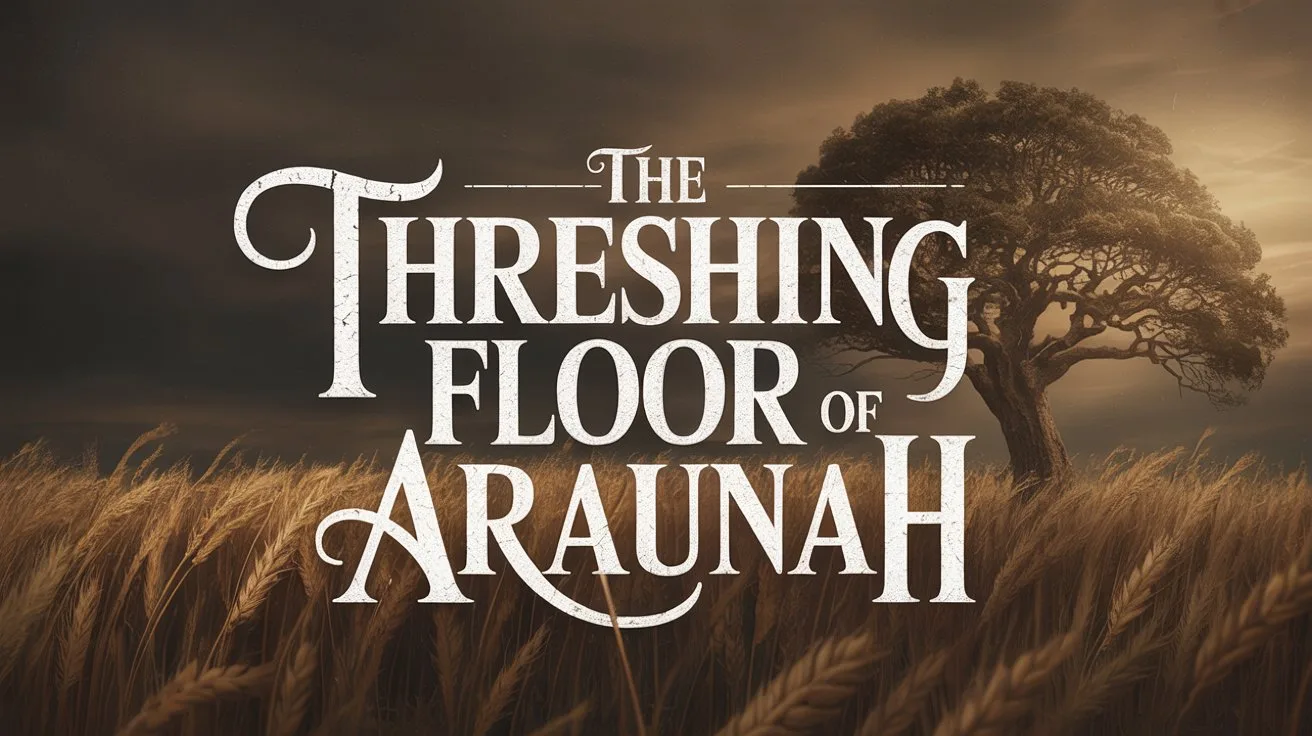David had sinned. Then he ordered a census of Israel, which is something God did not command. It was an act rooted in pride and control, not dependent on the Lord. The result was judgment. God gave David three choices for punishment: famine, fleeing before enemies, or a plague. David chose the plague, trusting the mercy of God over the cruelty of men. Seventy thousand men had died, and then The Angel of the Lord halted His hand over Jerusalem.
“And the angel of the LORD was by the threshing floor of Araunah the Jebusite.”
(2 Samuel 24:16)
That threshing floor became sacred ground, not because of the place itself, but because God’s mercy met judgment there. David, seeing The Angel of the Lord there, fell on his face in repentance. God then commanded the prophet Gad to tell David to build an altar right there. And so David obeyed.
The Test of Costly Worship
When David approached Araunah to purchase the threshing floor, Araunah offered it freely. He was willing to give David the oxen for the burnt offering, the yoke for firewood, and the land for the altar—all without charge.
But David refused.
“Then the king said to Araunah, ‘No, but I will surely buy it from you for a price; nor will I offer burnt offerings to the LORD my God with that which costs me nothing.’”
(2 Samuel 24:24)
That one statement speaks volumes about true worship. David knew that a sacrifice without cost was not a sacrifice at all. It might have been convenient, but it would not have been holy. It may have looked good to others, but it would not have honored God.
This is the heart of authentic worship: it must cost us something. Not because God needs our resources (He owns all things), but because what costs us little will never move our hearts. If it doesn’t require anything from us, it likely doesn’t reflect the depth of our devotion.
A Place of Mercy, A Place of Fire
David purchased the threshing floor and built the altar. He offered burnt offerings and peace offerings to the Lord. And fire fell.
“And the LORD heeded the prayers for the land, and the plague was withdrawn from Israel.”
(2 Samuel 24:25)
In 2 Chronicles we read this same location would later become the foundation of the temple Solomon would build.
“Now Solomon began to build the house of the LORD at Jerusalem on Mount Moriah, where the LORD had appeared to his father David, at the place that David had prepared on the threshing floor of Ornan the Jebusite.”
(2 Chronicles 3:1)
The threshing floor is a place where grain is separated from chaff. This became the center of God’s presence on earth. It became holy ground, not because of its geography, but because it became an altar of obedience, repentance, and costly worship.
The Cost of Real Faith
David’s refusal to offer a costless sacrifice is a direct challenge to modern, casual Christianity. We live in an age where comfort is idolized and faith is often reduced to what is convenient or emotionally satisfying. But Scripture teaches a different way.
Paul urges believers:
“I beseech you therefore, brethren, by the mercies of God, that you present your bodies a living sacrifice, holy, acceptable to God, which is your reasonable service.”
(Romans 12:1)
A living sacrifice doesn’t climb off the altar. It stays there, surrendered. That’s not a metaphor for simply showing up at church, it’s the full offering of our lives. Time. Energy. Priorities. Desires. Our worship is not in the words we sing, but in the choices we make daily to honor Christ, even when it costs us something.
Jesus never hid the cost of discipleship. He called us to count the cost before following Him.
“For which of you, intending to build a tower, does not sit down first and count the cost, whether he has enough to finish it—”
(Luke 14:28)
“And whoever does not bear his cross and come after Me cannot be My disciple.”
(Luke 14:27)
Faith that costs nothing, accomplishes nothing. Real faith obeys when it’s hard, gives when it hurts, and continues when others fall away. We are not saved by our sacrifice, but our love for God is proven by it.
Worship That Moves The Heart of God
David’s offering wasn’t extravagant by the world’s standards. But it was costly to him. And that was what mattered. God doesn’t measure your offering by its size, He measures it by your heart. Just like the widow who gave two mites, it’s not the amount, it’s the devotion.
“So the LORD heeded the prayers for the land.”
(2 Samuel 24:25)
God responded to David’s sacrifice, not because He needed an altar, but because it came from a heart that would not cheapen worship. That kind of heart still moves the hand of God.
My Final Thoughts
The threshing floor of Araunah is more than an ancient parcel of land, it’s a mirror for every believer. When David said, “I will not offer what costs me nothing,” he was modeling a heart that truly fears and honors God. In a world where convenience is king, that kind of worship stands out. It is holy. It is sacrificial. And it is powerful.
Worship isn’t about what we feel. It’s about what we’re willing to lay down. Real faith will cost you something. It always has. And that’s what makes it worthy.





 Get the book that teaches you how to evangelize and disarm doctrines from every single major cult group today.
Get the book that teaches you how to evangelize and disarm doctrines from every single major cult group today.